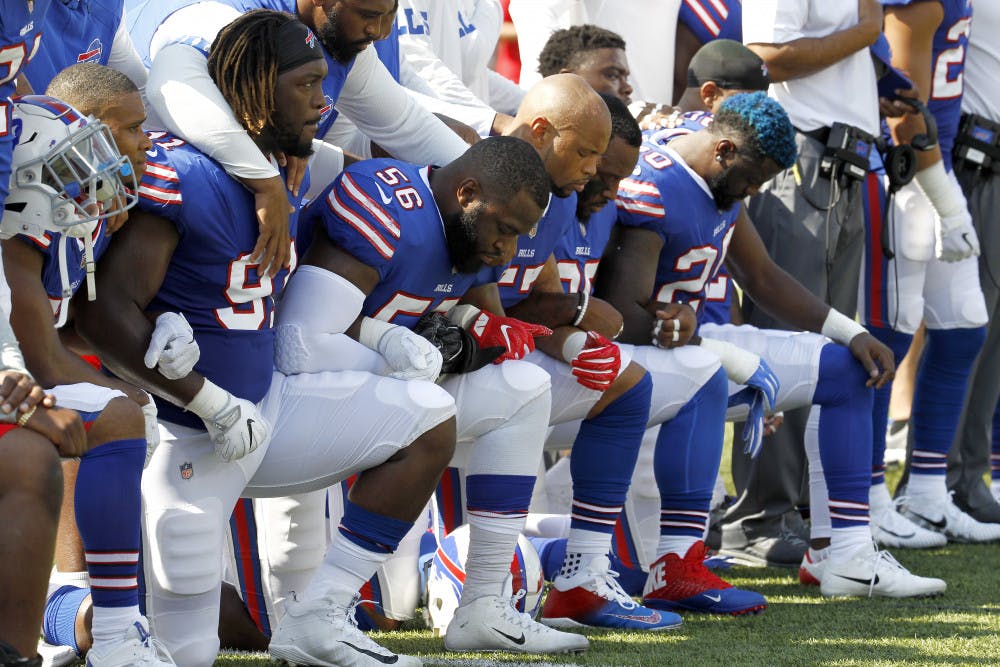Go ahead and look away for a second. Pause. Breathe. Relax. You’re going to need a clear head and a clearer conscience for this. Now, I want you to grab your phone, go on Twitter, type “knee” into the search bar and scroll through what pops up.
Isn’t it amazing a word that saves us from saying “the joint between the thigh and lower leg” every time we need to refer to that part of our anatomy can create so much passion? So much controversy? So much rage? Here, for example, is the first thing I found just by typing in that word, courtesy of @BreeNewsome: “Here again, folks booed a team taking a knee even tho it didn’t happen during anthem playing. BECAUSE THEIR ANGER IS NOT ABOUT THE ANTHEM.”
The context of that tweet isn’t important. It’s just meant to show how emotional people get over the idea of athletes kneeling before sporting events, which the athletes say brings awareness to issues of police brutality and racism, while their opponents say it disrespects the military and the country.
I used the word opponents deliberately. These aren’t merely detractors. These aren’t folks with small disagreements. Whichever side of this ideological fence you’re on, there’s no room for nuance. The athletes are either traitorous disgraces who should be fired, or they’re heroic megaliths of modern society. And interestingly, both sides like to use the First Amendment to make their cases.
On the pro-athlete side, the First Amendment gives the kneelers freedom of speech to use how they please. On the anti-athlete side, the First Amendment is protected by our military, and we should show our soldiers -- and, by extension, the First Amendment -- respect by standing for the anthem.
Either way, that’s the incorrect way to have this discussion. This, of course, assumes a discussion of this topic is worth having. Some on both sides probably disagree. It’s just too obvious to talk about it. I, however, prefer a dialogue about an issue so divisive, so polarizing and important.
With that out of the way, this argument has nothing to do with the First Amendment, legally speaking. Freedom of speech is meant to protect people from being persecuted for speaking out against the government. Barring a constitutional crisis the level of which this country has never seen, Colin Kaepernick isn’t headed to prison for his kneeling, nor are his fellow kneelers. This just isn’t a free speech issue in the legal sense. And that is exactly why I argue using the First Amendment is the wrong way to have this conversation.
When examining the ethical implications of kneeling for the anthem, it shouldn’t be about what’s legal and what’s not or respect for what’s legal and what’s not. The conversation should be about what’s right and what’s wrong. And that can be about the method or the message.
Some feel it’s inappropriate methodology because it shows disrespect for veterans. Some feel the message they’re trying to get across isn’t clear enough. Regardless, the best way to talk about that isn’t by saying it goes against the First Amendment. And on the other side, saying anything less than total athlete autonomy in how they represent their employers is an infringement upon their First Amendment rights isn’t any better.
This shouldn’t be about the First Amendment in a legal sense. This should be about the First Amendment’s essence. Not, “What are the limits of the law?” but instead, “What is the law supposed to accomplish?”. In other words, what do we want freedom of speech to mean?
It could mean its legal intention, protecting Americans from government tyranny. Or it could extend beyond that, meaning not just protection from the government, but an unabridged right to speak your mind regardless of whose feelings it hurts or who it offends.
Athletes are in a unique position to do this, because unlike an engineer or a chef, they’re rarely replaceable. If Tom Brady takes a knee before a game, he isn’t going anywhere. If a construction worker shows up to a site in full Nazi regalia, probably not.
Granted, Kaepernick hasn’t caught on with a team since becoming the face of the kneeling movement, but it’s become too mainstream for that to happen to everyone.
For the sake of transparency, I’ll say I lean heavily toward the side of the athletes. You’re welcome to disagree, and I’d love to have an honest discussion about it. But if we’re going to talk, let’s talk about what ought to be. Not what’s legally permissible.
Ethan Bauer is a sports writer. Keep an eye out for his next column by following him on Twitter @ebaueri. Contact him at ebauer@alligator.org.
Buffalo Bills players kneel during the national anthem prior to an NFL football game against the Denver Broncos, Sunday, Sept. 24, 2017, in Orchard Park, N.Y. (AP Photo/Jeffrey T. Barnes)






